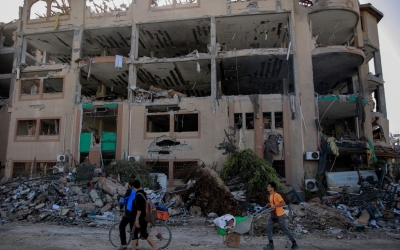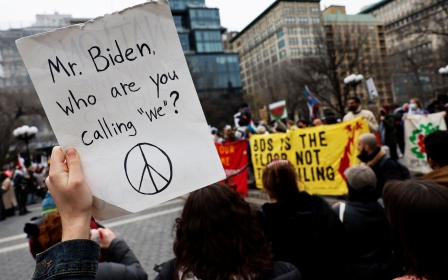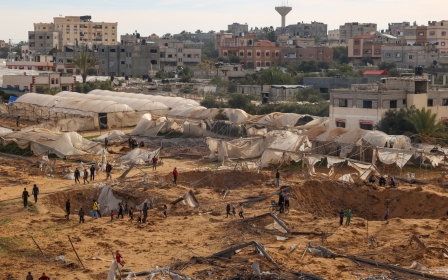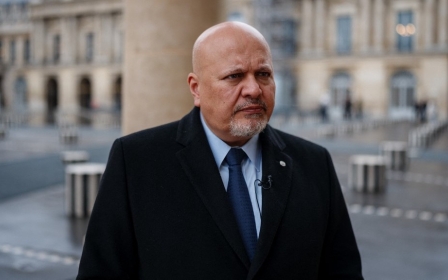War on Gaza: The displaced Palestinian teacher undeterred by Israel’s war
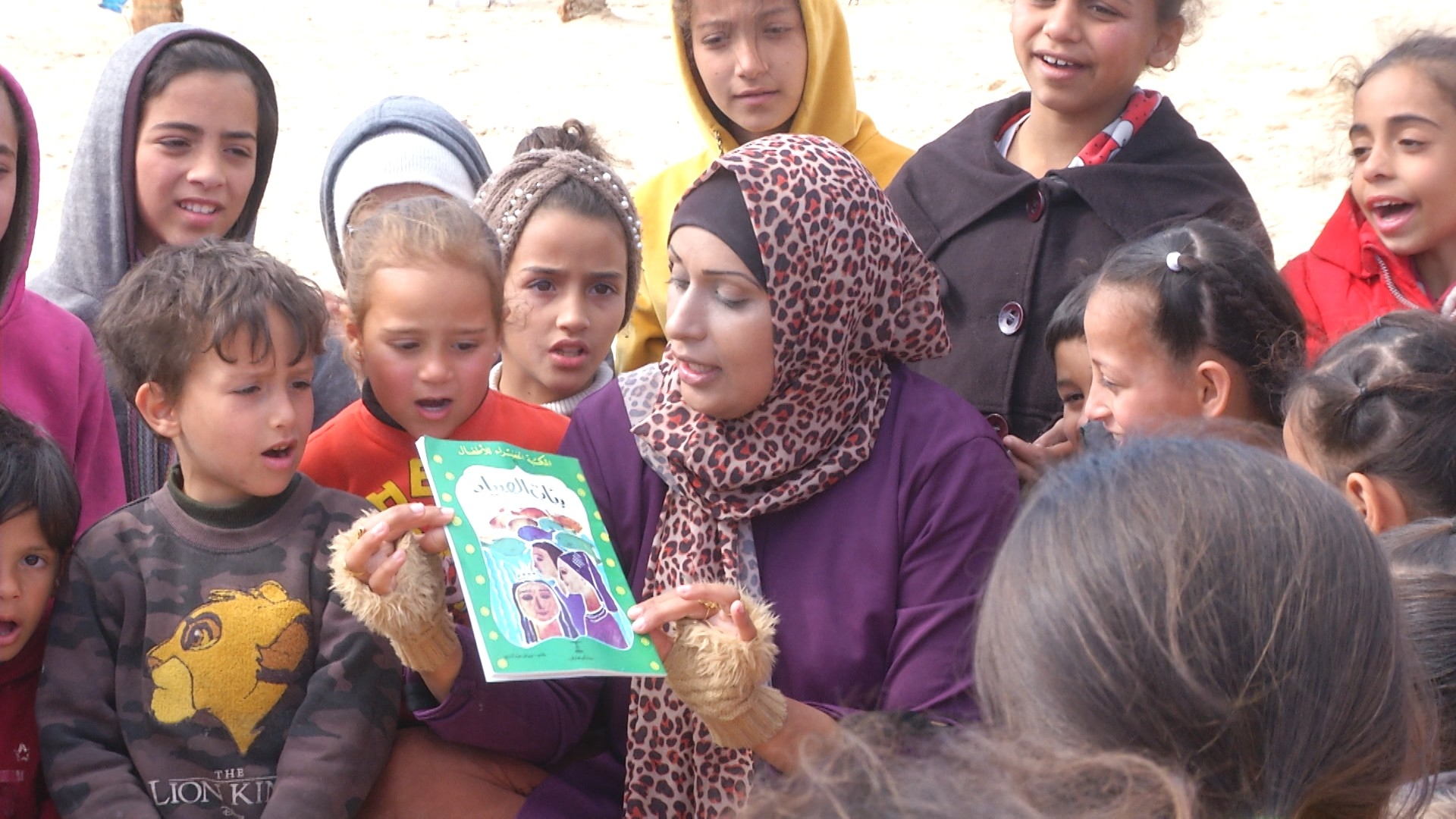
In 2020, Asma Mustafa, a Palestinian English teacher from Gaza, won the Global Teacher Award after she competed against thousands of teachers from 110 countries.
Despite living in the blockaded enclave with limited access to the outside world, Mustafa presented creative ideas to teach English through games and imaginary trips around the world.
Four years later, Mustafa is forcibly displaced in Al-Mawasi area in Rafah, yet she remains defiant as the Israeli war continues to take a toll on all aspects of Palestinian life.
Mustafa has been forced to evacuate three times so far. The first time she was displaced, she left her house in the north of Gaza and sought refuge in a school in the south.
“After evacuating to a school, my family and I stayed at the library there. There were a lot of books. I started reading books to my own children and the children of my relatives first,” Mustafa told Middle East Eye.
'I look at the children around me and think of them as a treasure...They should never stop learning'
- Asma Mustafa, English teacher
It did not take her long before she decided to use her knowledge and experience to help more children who also had to evacuate to the same school.
“I told all parents at that school that I will use a classroom daily at 15:00 to give a class to the children to help them cope with the war around them and to try and give them some sense of routine,” she said.
“I get books from the library and read out stories and then we have a discussion together. I also try to teach them some English vocabulary as I have been an English teacher for 16 years.”
Al-Mawasi is located near the border with Egypt. During the war, this area has been labelled as a safe zone by Israel, but is now at risk of attacks as a Rafah invasion seems imminent.
Hundreds of thousands of people have evacuated northern parts of Gaza to al-Mawasi, and currently live in makeshift tents there.
Yet the delivery of humanitarian aid remains very limited in this overcrowded area. A high wall covered with barbed wire, which can easily be spotted, separates the area from the Egyptian Rafah.
After running her daily class for two months at the school, the Israeli bombings intensified in the area. Once again, Asma had to leave the place she made home and the class that gave her and the children there some stability.
This time, she had nowhere to go. So, along with her family, they evacuated to the very south of Rafah, to Al-Mawasi, and ended up living in a tent that gets flooded every time it rains.
“As soon as I was settled in this tent and got my head around what happened to us, I decided to continue what I started at the school because again these tents are full of children who have not gone to school since October,” she added.
Mustafa, as well as more than two million Gazans, struggle to not only find safety and shelter from the Israeli bullets and bombardments, but also to find essentials like electricity, food, water, medicine, and hygiene products.
“I look at the children around me and think of them as a treasure,” she said, describing her motivation to volunteer as a teacher during the war.
“They should never stop learning. I believe that if these children are to lose their very basic right of education, then the future of Palestine will be lost as well.
“My duty as a teacher is to look after the students’ brains and encourage them to fight for their rights and their education no matter the circumstances.”
'I miss my school books'
Mustafa believes that the children of Gaza are in dire need of shelter, food, and water, but their “hearts and brains equally need to be looked after” especially during the mental distress of the war.
While children around the world look forward to their school holidays and weekends to take a break from their schoolwork, ironically, children in Gaza are looking forward to going back to school, she said.
'I will teach children for as long as I am alive, and wherever this war forces me to go'
- Asmaa Mustafa, Palestinian teacher
“I love Mrs Asma Mustafa. She is so much fun. She has helped us a lot while we are here in tents. She reads us stories and then we discuss it with her, but I still wish we could go back to our classrooms and learn normally,” Lama Kishko, one of the children who attends Mustafa’s classes and who was also forcibly displaced a few times, said.
“I miss my school books and even doing homework. This war has affected us all mentally. I am tired and I just want it to end so I can go back to my normal life,” she told MEE.
Nahida Dalloul, another young girl who lives in a nearby tent, has also chosen to attend Mustafa’s daily classes.
“I want to attend the classes because I haven’t learned anything in four months. I want to learn. I wish I could write in my notebooks, see my classmates and my teachers, write on the board, and draw. I wish I could do all of that again,” she said.
Mustafa’s classes have gained admiration among the parents. They say that she created an atmosphere that successfully took their children’s attention away from the war. Her classes helped the children to get to know each other and make friends.
A father whose daughter also attends Mustafa’s classes believes that the award-winning teacher took a lot of pressure off the parents’ shoulders.
He says: “Asma’s classes helped create a life for these children. Instead of the constant talk about the war and the quest to get some water, the children come back to the tent with some new stories to share with us.
"Even after the class is over, the children stay together and play.”
With the escalation of the Israeli operation in the south and the threats of the expansion of the Israeli ground operation in Rafah, Mustafa and her students are in constant worry that yet again they must lose what they have created in that area.
They are concerned that they will be forced to move somewhere else and lose that sense of community they have found.
However, Mustafa is undeterred by this fear.
“I will teach children for as long as I am alive, and wherever this war forces me to go,” she said.
This article is available in French on Middle East Eye French edition.
Middle East Eye propose une couverture et une analyse indépendantes et incomparables du Moyen-Orient, de l’Afrique du Nord et d’autres régions du monde. Pour en savoir plus sur la reprise de ce contenu et les frais qui s’appliquent, veuillez remplir ce formulaire [en anglais]. Pour en savoir plus sur MEE, cliquez ici [en anglais].


